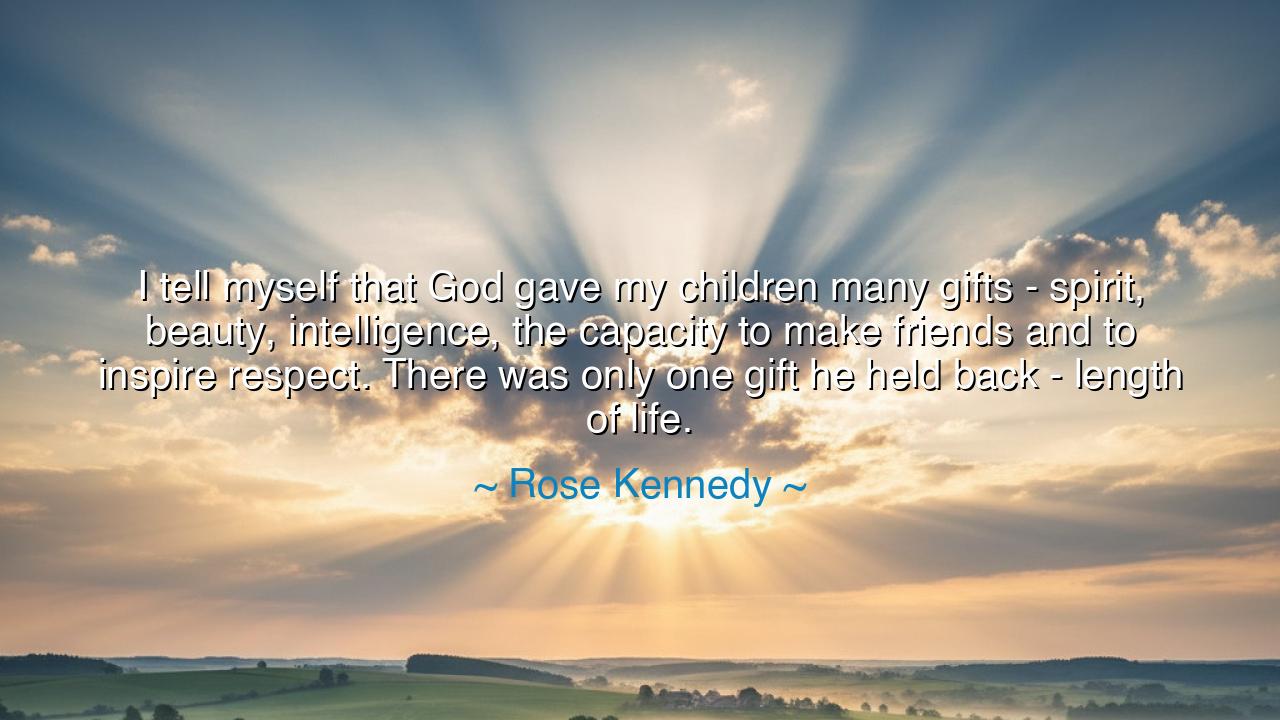
I tell myself that God gave my children many gifts - spirit
I tell myself that God gave my children many gifts - spirit, beauty, intelligence, the capacity to make friends and to inspire respect. There was only one gift he held back - length of life.






“I tell myself that God gave my children many gifts — spirit, beauty, intelligence, the capacity to make friends and to inspire respect. There was only one gift he held back — length of life.” — so spoke Rose Kennedy, matriarch of one of America’s most storied and sorrowful families. In this simple yet heart-rending reflection, she gives voice to a truth that is both deeply human and profoundly spiritual: that even the most blessed lives are not spared from the shadow of mortality, and that faith must sometimes make peace with grief rather than be rescued from it.
The origin of this quote lies in the tragedy that shaped Rose Kennedy’s life — the loss of several of her children, each one gifted, brilliant, and full of promise. The Kennedy family, known for its beauty and ambition, seemed touched by both destiny and doom. Her sons, John F. Kennedy and Robert F. Kennedy, were men of charisma and vision who rose to the heights of power, only to be struck down by assassination. Her daughter, Kathleen, died in a plane crash; her son Joseph Jr., in war. In the quiet of her later years, Rose Kennedy, a woman of deep faith, sought understanding. And this was the wisdom she found — that God, in His mysterious balance, bestows gifts unevenly, and that some souls, though radiant, are not meant to walk the full measure of years.
In her words, there is neither accusation nor despair. There is acceptance — the serene courage of one who has walked through loss and chosen to hold fast to gratitude. She does not dwell upon what was taken, but upon what was given: spirit, beauty, intelligence, friendship, respect — all the qualities that make life luminous, even if brief. She does not curse the brevity of her children’s lives; she honors the brilliance that filled them. For in her faith, length of days is not the measure of divine favor, but the depth of virtue, the power of love, and the endurance of memory.
Her reflection echoes the wisdom of the ancients, who often spoke of fate and the gods’ gifts as both blessing and burden. The Greek hero Achilles, for instance, was offered a choice: to live long and forgotten, or to live briefly but with immortal glory. He chose the latter, and though his days were few, his name lives on forever. So too did Rose Kennedy’s children burn brightly in the firmament of history, their lives a mixture of greatness and tragedy. In this, she saw not cruelty, but a divine mystery — that the brightest flames are often the shortest-lived, and that the meaning of life lies not in its length, but in the light it gives while it burns.
Rose Kennedy’s words are also a meditation on grief and faith. For grief, in its first fire, demands to know why. Why must innocence suffer? Why must beauty fade? But faith, when tested and tempered, does not always seek answers; it seeks peace. “There was only one gift He held back,” she says, not in anger, but in reverence. It is the tone of one who has looked upon the abyss and still chosen to trust the divine order of things. Her acceptance transforms sorrow into wisdom, and pain into praise. It is as though she whispers to the generations after her: Do not measure God’s goodness by the span of life, but by the love that fills it.
Her teaching is one for all who mourn. When we lose those we love, it is easy to see only the years we have been denied. But Rose Kennedy teaches us to see the abundance within the years that were given. The child who lived but a short time may have taught more of love than one who lived a century without compassion. The friend who departed early may have left behind a kindness that outlasts their body. Life’s worth is not measured in time, but in tenderness. Each life is a gift, even when it is fleeting; and though we ache for what was withheld, we must honor what was bestowed.
Therefore, my listener, take this truth as your own: grief and gratitude are not enemies, but companions. When the hand of loss touches you, remember that love itself is proof of divine favor — that to have known and cherished another, even for a moment, is to have touched eternity. Speak their names, remember their laughter, carry their virtues into your own deeds. In this way, the “length of life” denied to them becomes the legacy of life fulfilled through you.
For Rose Kennedy’s wisdom endures: that sorrow, when embraced with faith, can become sanctified; that even the hardest fate can yield beauty when met with grace. And so she teaches us to look beyond the brevity of mortal days and see, as she did, the eternal gifts that death cannot touch — spirit, beauty, intelligence, friendship, and love — the treasures that, once given, are never lost.






AAdministratorAdministrator
Welcome, honored guests. Please leave a comment, we will respond soon